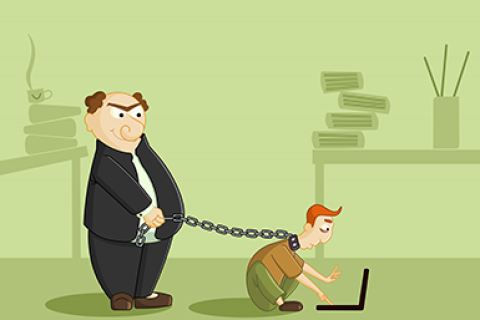New theory helps expose unjust power structures in the economy
Political philosophers Rutger Claassen and Lisa Herzog win prize for article

The European Journal of Political Theory has awarded an article by Prof. Dr. Rutger Claassen (Professor of Political Philosophy and Economic Ethics) and Prof. Dr. Lisa Herzog (University of Groningen) as the best article of the 2021 volume. In the article 'Why economic agency matters: An account of structural domination in the economic realm' Claassen and Herzog introduce a theory to understand how domination and injustice can arise within economic structures.

Debates about "injustice" in economics are often about how money or wealth are distributed (as "outcomes" of economic processes). But these outcomes are preceded by power relations, which are interwoven in the structure of the economy itself. Think, for example, of relationships between employers and employees, health insurers and patients, tenants and landlords, or between lenders and entrepreneurs. But not all forms of dependence are unjust - the ability to borrow money, for example, can also be very convenient. How can we objectively assess when such structures are unjust?
Economic agency: personal capacities and social options
Therefore, Claassen and Herzog introduce the concept of economic agency. They show how this concept can be used as a criterion to expose unjust structures in the economy. Economic agency, according to Claassen and Herzog, can be seen as a combination of personal characteristics (including rational and emotional capacities) and possibilities for action that arise from the social situation. To be able to apply for a benefit, for example, you not only need a social security system, but you must also be able to find the right office and fill in the necessary forms properly. Together, personal and social characteristics thus determine your ability to acquire the economic resources you need to shape your own life.
Making injustice measurable
The authors argue that unequal power relations arise when a person's economic agency is limited to the point where that person has insufficient control over his or her own life ("autonomy"). To determine whether unequal power relations are also unjust, Claassen and Herzog propose to distinguish different levels of economic agency. In this way, economic agency forms a yardstick along which all situations within economic structures can be assessed.
Prize winning article
The European Journal of Political Theory prize was awarded by a selection of the journal's Associate Editors, who commended the complexity and nuance of the argument.
The authors

Rutger Claassen is Professor of Political Philosophy and Economic Ethics in the Department of Philosophy & Religious Studies at Utrecht University. He investigates the philosophical foundations of the liberal-democratic rule of law and the ethical and political dimensions of the market economy. He is project leader of The Business Corporation as a Political Actor (2020-2025), a major research project for which he received an ERC Consolidator Grant from the European Research Council. In it, he and his team investigate the question of what social responsibilities companies have, and how they can be socially accountable. He is also project leader of the NWO-funded research project Private Property and Political Power in Liberal-Democratic Societies (2017-2022). In it he investigates the interaction between private property rights and the public sphere of democratic decision-making.
Lisa Herzog is Professor of Political Philosophy at the University of Groningen.

